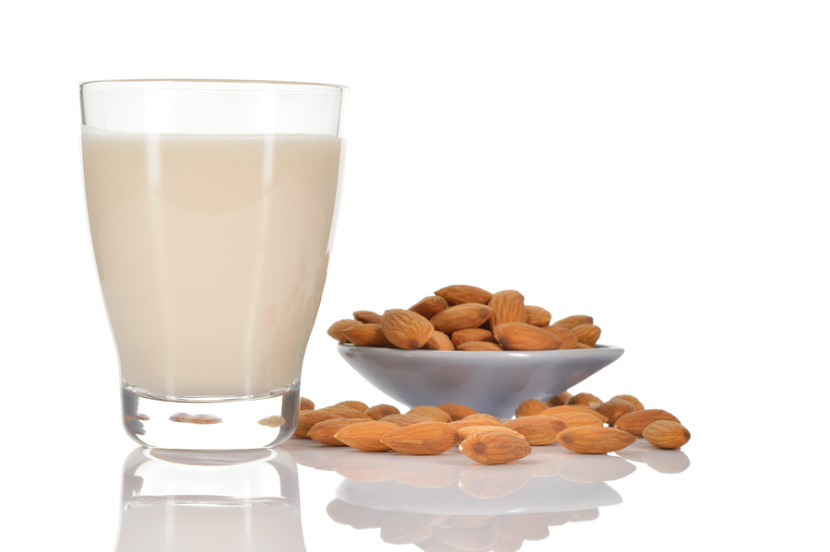
What do soy beverage, rice beverage and almond beverage have in common? They are all plant-based beverages. With so many options available, it can be hard to know which one may be best for you. Read on for more information on plant-based beverages and find out how they compare to cow’s milk.
What are plant-based beverages?
Plant-based beverages are beverages made from plants. Some plant-based beverages are made from:
- Soy
- Rice
- Almonds
- Oats
- Cashews
- Coconut
How do plant-based beverages compare to cow’s milk?
Protein in plant-based beverages
Cow’s milk has about 9 grams of protein per cup. Plant-based beverages range from 0 to 7 grams of protein per cup (see chart below). Compared with the other plant-based beverages, soy beverages have the most protein unless additional protein has been added.
Calcium and vitamin D in plant-based beverages
The amount of calcium found in a cup of cow’s milk is about 30% of your daily needs (this is called % Daily Value). Fortified plant-based beverages have about 20 - 25 % (see chart below).
Tip: Shake plant-based beverages before you pour it. This will help ensure that the calcium ends up in your cup and not in the bottom of the container.
Cow’s milk has 45% of your daily value of vitamin D per cup. Fortified plant-based beverages often have about 10%.
Sugar in plant-based beverages
A cup of cow’s milk has about 13 grams of natural sugar from lactose. Most plant-based beverages including soy, coconut, almond, oat and cashew beverages are lower in sugar and are lactose-free. However, flavoured plant-based beverages can contain twice the amount of sugar. To cut back on sugar, opt for the “original” or “plain” flavour, rather than sweetened varieties.
The chart below compares plant-based beverages per cup*
|
Beverage (enriched; original flavour)
|
Calories
(kcal)
|
Protein
(g)
|
Fat (g)
|
Carbs
(g)
|
Sugar (g)
|
Calcium %DV
|
Vitamin D
%DV |
|
Cow’s milk (1%)**
|
110
|
9
|
2.5
|
12
|
12
|
30%
|
45% |
|
Soy
|
100
|
7
|
4
|
8
|
5
|
23%
|
10% |
|
Coconut
|
80
|
0.5
|
5
|
8
|
7
|
23%
|
10% |
|
Oat
|
80
|
2
|
3.5
|
12
|
4
|
23%
|
10% |
|
Almond
|
60
|
1
|
2.5
|
8
|
7
|
23%
|
10% |
|
Cashew
|
60
|
1
|
2.5
|
9
|
8
|
23%
|
10% |
*Current as of November 2021 for select brands. Not representative of all brands. Read the Nutrition Factspanels to choose a beverage that is right for you.
** Skim, 1%, 2% and whole milk only differ in the amount of calories and fat it has.
% DV = percent daily value. If a serving of food has 15% DV for calcium, it would provide 15% of the total calcium an adult would need for the day (based on an adult eating 2,000 calories per day).
Can children drink plant-based beverages?
It depends. Children under 2 years of age should not be given plant-based beverages because they do not have enough fat or protein to meet their needs. Whole cow’s milk (3.25%, also known as homogenized milk) is recommended for children under the age of 2. However, if your child has a milk allergy or is vegan, work with a dietitian to find the best option to meet their needs.
Children over 2 years of age can be given plant-based beverages. Work with a dietitian to find a beverage that best meets their protein, fat, vitamin and mineral needs.
A note on goat’s milk
All of the plant-based beverages mentioned above come from plant sources. That means they do not contain animal products. Goat’s milk falls into a different category. It is milk from goats, so it is an animal product and contains lactose. That means it is not suitable for those who are lactose intolerant or following a vegan diet.
Enriched whole goat’s milk has a similar amount of protein, vitamins and minerals as whole cow’s milk and can be used as a substitute. However, some people who are allergic to cow’s milk will also react to goat’s milk. Check with your dietitian to see what is right for you and your family.
How can a dietitian help?
Choosing a plant-based beverage that is right for you and your family can be tricky. A dietitian can work with you to choose foods and beverages that not only meet your nutritional needs, but that also meet your preferences, goals, medical history and culture.
If your baby or child has a milk allergy or is following a vegan diet, it is best to work with a dietitian to make sure they are getting all the nutrients they need to grow and be healthy. Connect with a dietitian today!
Bottom line
If you choose plant-based beverages, make sure that it is “fortified” or “enriched.” That means vitamins and minerals have been added to it. If it’s not fortified, it is not as nutritious. It will be mostly water, starch and sugar. If you choose plant-based beverages look for the unflavoured versions which have less sugar. Compare labels or check with a dietitian if you are unsure which one to choose.
You may also be interested in:
The Scoop on Soy
The Juicy Story on Drinks
Facts on Milk Allergies
Managing Lactose Intolerance
This article was written and reviewed by dietitians from Dietitians of Canada. The advice in this article is intended as general information and should not replace advice given by your dietitian or healthcare provider.
Last Update – May 9, 2022